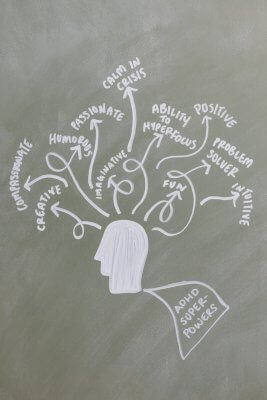ADHD and Relationships – the Truth You Need to Know

photo by Aline Viana Prado for Pexels
by Andrea M. Darcy
We all know the signs of adult ADHD by now. But somehow ADHD and relationships and the very serious ways the two interact is less discussed. Even when the effects of attention deficit disorder on our romantic, family, social, and work lives can leave many struggling and lonely.
[Not sure if you have attention deficit or not? Take our free ADHD quiz.]
How ADHD and relationships interact
They are many ways ADHD can negatively affect the ways you relate with others. These can mean that if you have ADHD, you constantly feel judged and rejected. If you are the friend, partner, or colleague of someone with ADHD, you can be left frustrated, confused, and upset.
It can help to look at this through the lens of the three key ADHD symptoms. These are inattention, impulsivity, and hyperactivity.
Inattention in relationships
A key symptom of adult ADHD can mean that our attention is not one-pointed but scatters everywhere, called ‘inattention’. This can lead to the following relationship problems.
1.You get bored of romantic relationships and friendships easily.
The ADHD brain does not tolerate boredom well. ADHD and relationships can mean that once you move past the exciting romantic stage into the steady phase, you might find yourself chomping at the bit. Or, worse, sabotaging all and breaking up.
The same can happen with friendships. The moment someone starts to be a bit boring or does one thing you don’t like, you stop making an effort.
In fact you might feel that most (if not all ) relationships are disappointing. A 2019 research study based on self-reporting found that adults with ADHD reported lower levels of relationship satisfaction than those who didn’t have ADHD. And unfortunately one of the main ways to deal with this was found to be avoidance, which is an unhealthy coping mechanism.
2. You hyperfocus before you get bored, so others are left confused or angry.

photo by Tara Winstead for Pexels
One lesser known fact about ADHDers is that it’s not that we lack focus entirely. It’s that our focus is extreme, one or the other, non-existent or very intense, known as ‘hyperfocus’. When we want to, we can be so focused the rest of the world falls away. The main issue here is that we generally focus on the wrong things, not the practical things.
And if we hyperfocus on someone we like, they can feel very special and think we are in love with them. Then, when we get bored, and as that research study points out perhaps revert to avoidance, even just dropping that person entirely or cutting them out? They might be (justifiably) furious.
2. Your lack of attention to detail and organisation puts you in the dog house.
Non ADHDers, particularly those who thrive on structure and details, might find your inability to finish what you start and attend to details frustrating. This can particularly cause problems in the workplace.
3. You tend to be late and to forget things like birthdays.
The ADHD brain is creative, fun, exciting, and sometimes joyous for others to be around. But when it comes to remembering things like birthdays, or important stories someone confided in you, or to being on time? Things an ADHD brain struggles with? You might be seen as a letdown.
4. Regular social events bore you.
You know you should stay until the end of a family gathering, but you are jumping out of your skin with boredom and leave, upsetting others. Or you know going to the pub with colleagues would greatly improve your workplace relationships, but you find it so utterly boring you can’t hide it. And others end up finding you a snob.
Impulsivity in relationships
Impulsivity means you rush into things before you can stop yourself. Even if you really try as hard as possible to not do things you regret, your brain overrides your desire to be practical and there you are. Acting or speaking before you mean to. Which can lead to the following relating issues.
1. ADHD and relationships can mean you rush in to both romance and friendships.
Is your life an endless series of short, exciting relationships? ADHD and relationships can mean this is a common pattern. At its core this happens because of impulsivity. You date people despite knowing you are going too fast, or they are rumoured to be trouble, or deep down you know better. Your impulsive streak gets the better of you.
2. You say things before you realise you are saying them.

Photo by Jeswin Thomas for Pexels
Sometimes it might be funny and make people laugh. Or your outbursts might be full of great ideas that have you seen as an innovator at work. But let’s be honest, that brain that seems to speak through your mouth before you can stop it can also mean that you say things you regret, even if it’s often true. The end result is upsetting others or being seen as mean, when you had no intention of being so.
3. You are less likely to practice safe sex and more vulnerable to STDs.
Let’s be honest, if there is one moment the best of us can be impulsive it can be under the influence of lust. Add in some ADHD and we can make impulsive and very poor decisions in our sex lives.
A study on young adults with ADHD found they were four times more likely to be treated for STDs.
4. You can be emotionally volatile (anger is common).
It’s not just our behaviours that can be impulsive if we have ADD, it can also be our emotions that are impulsive. We can burst into tears at the slightest provocation. Or, a common issue with those with ADHD, not have a handle on our anger.
A large-scale analysis of ADHD research to date concluded that almost 70 per cent of adults with ADHD suffer from emotional dysregulation (the inability to stop your emotions going from zero to a hundred rapidly). It’s no wonder that some researchers feel that anger and emotional issues should become a core symptom for diagnosis.
Hyperactivity in relationships
Hyperactivity in adults doesn’t just mean someone who is energetic and loud. It can also manifest as restlessness, or show up in the way you communicate.
A study spanning 13 years that followed 149 young people into adulthood found that hyperactivity meant having fewer closer friends, fewer close friends, more trouble keeping friends, and more social problems.
1. Your energy drains others and you are seen as ‘too much’.
Your fast talking, fast thinking, exciting ideas and humour might be what attracts some people. But it will also be the very thing that puts other people off. They see you as draining, or ‘too much’. Which can feel terrible when you are trying your best but this is who you are.
2. You talk in circles, go too fast, overshare and interrupt others.
ADHD hyperactivity can affect the way you communicate. Not only can the way your brain talks in circles or how you keep several ideas going in one conversation overwhelm others. But you can talk really fast and overshare.
Then there can be a marked tendency to interrupt and talk over others no matter how hard you try not to. Again, the brain often overrides the mouth when it comes to ADHD, and misjudges timings.
And the end result is that others who don’t understand your ADHD can you see you as unbearable or rude. And you can be left feeling terrible and with low self-esteem, or socially withdrawing.
3. You get sensorially overwhelmed and need alone time.
A less talked about symptom of ADHD is shared with autism sufferers, and that is sensorial overwhelm. This can mean that you are out at an event and suddenly all the noise and lights are too much and you feel panicky. Others can find it confusing, and you can start avoiding such events, or become introverted in a way that leaves you lonely.
Sick of feeling alone, misunderstood, and ‘too much’ for others? Talk to ADHD expert talk therapists who know all about ADHD and relationships and can help you relate better and raise your self-esteem.
 Andrea M. Darcy is an expert on ADHD and relationships due to personal experience. She was diagnosed with ADHD over two decades ago. A health and wellbeing expert, she also runs a consultancy helping people plan their perfect therapy journey. Find her on Instagram @am_darcy
Andrea M. Darcy is an expert on ADHD and relationships due to personal experience. She was diagnosed with ADHD over two decades ago. A health and wellbeing expert, she also runs a consultancy helping people plan their perfect therapy journey. Find her on Instagram @am_darcy





Most of my life, I thought my dad must be right I’m broken. Leaving me with a very negative self image abs abusive self talk. I’d avoid any social interactions possible, because surely at first they’d be interested and that would start a high level of expectations, or I’d make a total mess of myself very first thing. Either way it would end up the same, I’d hate myself for falling short of expectations or saying/ doing something embarrassing and unexplainable. It’s been traumatic, I’m above average IQ, and what’s worse I’m told I’m attractive, which is awkward, women often stare at me and gay men hit on me, and I don’t feel or see whatever they do so it’s really strange. I’m often left feeling I’m being made a joke of, it doesn’t do well for my social anxiety. My entire situation is overwhelming, I have been diagnosed ADHD, bipolar, eating disorder, anxiety, Aspergers, depression, tinnitus, overly observant, and the more I learn about it the more it explains how and why my life went the way it did, and why I’m what my uncle calls a “hermit”. Because when people see that I’m “attractive” then find out I’m smart, when the rest starts to show its face, they are totally repulsed. People make up this image in their head of who you are to them, and when something that doesn’t work with this character of you they have made up in their head, they get upset or insulted, and react like you personally and intentionally caused offense, almost like you assaulted them. It’s crazy, and they don’t let it go, so it just gets worse.
So that’s why I am a hermit in the woods. All I wanted from age 7 was to fall in love, be a great man and give a women my everything, but never happened, now almost 40 I have heart failure, literally a broken heart, and I could suddenly die at any moment. Used to make me cry, every day uncontrollably, for a little over a year. Till I just accepted it. I was once an engineer, an electrician, somebody important, now I’m a disappointment, a nobody. Huge bummer man, I’ll tell you what. Not what I had hoped for, that’s for sure.
So sorry to hear your sad story. Sounds like your dad’s negativity became your self talk which you lived by. Sending you a virtual hug 🤗
Omg. You are so amazing and accomplished so much! The saddest truth in life is finding the right person at the right time. I am here reading and studying because I met someone exactly like you. I fell, hard. Maybe it is the lack of increased excitement, but we moved from very close to trying our hands at friends. Maybe you had that same experience. Reach out, connect always be honest. People care, your person may still be there, hanging on.